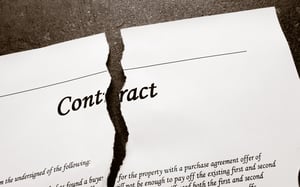
When you’re in the property management business, you need to protect yourself against lease breaks, which are residents’ failures to fulfill the terms of their leases. Surprisingly, most leases, even those created by professional property managers, do not have proper language around lease breaks in their leases. This means those property managers have no way to enforce a penalty if a resident moves out before their lease is up.
Why is it so important to account for lease breaks in your lease terms? Say a resident gives you a 30-day notice they’re moving even though they have several months left on their lease. They leave everything in perfect condition. If you don’t have a lease break addendum to protect you, the resident might not be responsible for any of the remaining rent, and you will have to return their security deposit. This is poor rental property management because it leaves you with no way to account for the unplanned time you’ll spend preparing, marketing, showing, and re-leasing a prematurely abandoned unit.
That being said, simply including lease break terms in your lease agreement is not enough. You must also manage resident expectations at all points in the rental process. Begin informing them about expectations from the initial call and continue to do so through the showing and eventual move-in. That way, the people who become residents know the rules from the get-go.
Lease break terms
To be able to tell residents the rules, the rules must be established. To establish rules that protect you from the repercussions of lease breaks, include the following elements in your lease terms:
- How far in advance the resident must notify you of their intentions to break the lease
- The penalties associated with the lease break
- How deposits will be handled in the event of a lease break
For example, you could state residents who wish to break their leases early must provide you with a 30-day notice, must pay rent for that 30 days, and must pay a penalty. You should also include information on how the security deposit will be handled and applied to outstanding balances. So, if a resident tells you on August 1 they’ll be moving out on August 31 even though their lease ends on December 31, the resident must pay rent for the month of August as well as a penalty. Depending on the language around the security deposit, you will want to include that here.
Exceptions to the rule
If the lease is broken substantially early, most penalties are cheaper than if the resident was required to pay rent for the entire lease term. In a situation where there’s less time left on the lease than the penalty requires payment for, the reasonable thing to do is to only hold the resident responsible for the remaining balance of the lease term. This is cheaper for them than paying the lease break penalty, and you still get the money you initially anticipated to receive.
The only residents who do not have to pay lease break penalties, under the law, are active duty members of the military who break their leases because of deployment. Anyone else, even those who are transferred to jobs elsewhere or have other legitimate reasons for breaking their leases, are legally liable for any penalties the lease outlines.
Good rental property management
While enforcing a lease break clause is a best practice for property management, so is being flexible. Be reasonable and try to understand the circumstances behind the resident’s failure to comply with your terms. Remember, you established these rules to protect yourself and your property. Use your judgment about when and how to enforce lease break rules but always include terms in your lease that can protect you if needed.
Want to know other things to look for to help you make the best return on your investment property? Download our Property Management Checklist!


